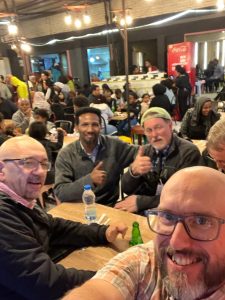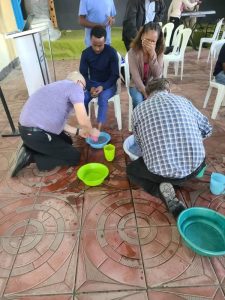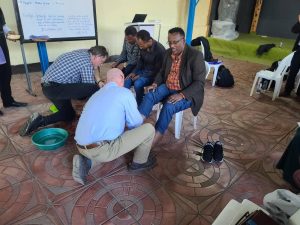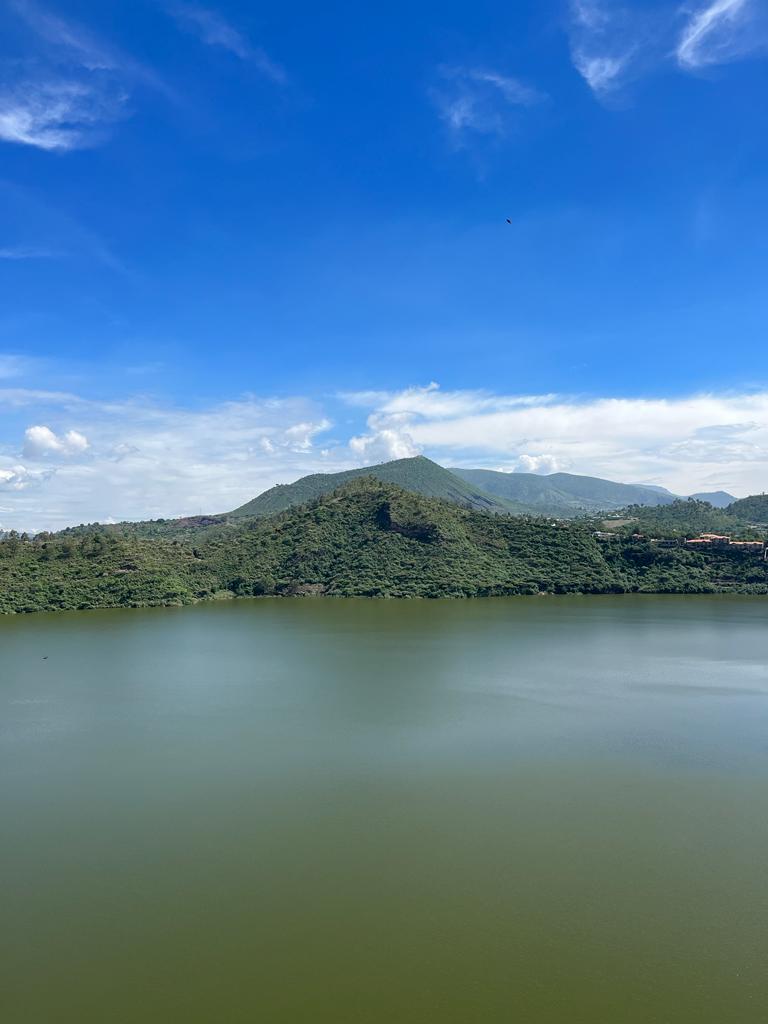I have always wanted to visit Ethiopia. Of all African countries it seemed the most mysterious to me. Perhaps because of its ancient Christian tradition dating back to the fourth century, its churches carved out of rock, or because of the legends surrounding Ethiopia as the location of the Ark of the Covenant (sorry Indiana Jones).
It has been quite an experience so far. We have enjoyed Ethiopian culture and especially the food. Well, I’ve tried to enjoy it. My sore throat has not relented, but I’ll get to that in a minute. The staple of Ethiopian food is injera, which is a porous elastic bread that when is rolled up and brought to your table looks exactly like an elastic bandage. When the bread is unrolled, all the food ordered by the table goes on the injera bread and then it is eaten communal style with your fingers. The food itself is a fusion of African, Middle Eastern, and Indian cuisine.
The weather has been quite different than we expected. It has rained every day in Addis Ababa, and most of them have been gully washers. Of course, this wreaks havoc with the power grid and knocks out generators as well. So much of the time in our guest house, we spend in the dark.
We have enjoyed getting to meet so many beautiful people in Ethiopia. They are so warm and hospitable. We were told by our host the best way to diffuse any potential issues with an Ethiopian is to put both hands over your heart and make a gesture toward them and it will immediately melt their hearts. No issues yet, but I’m putting that knowledge in my back pocket. Unfortunately, I have been distressed to see the number of street beggars, most of them women and children. It has been quite a while since I have seen the number of beggars as I have seen here in Addis.
On Sunday, we drove about an hour outside of Addis to the beautiful city of Bishoftu, where we worshiped with Immanuel Church. The drive is gorgeous. Once you leave the urban grittiness of Addis, green rolling hills greet you like a calf springing from the stall. Majestic mountains pierce the sky in the distance. The open space gently calms you from the madness of gridlock in Addis.
Having arrived in Bishoftu, I was scheduled to preach. However, as you know from my previous reports, I have been battling a severe sore throat. I had no idea if I could preach or not, but I intended to give it the old college try. By God’s grace I was able to make it through the entire sermon. Perhaps the most surprising thing was the incredible response to the Word. The title of my message was “We Do Not Lose Heart.” One of the main points in the sermon was that God’s strength is magnified in weakness. Our suffering is not pointless, but God uses it for His glory and our good. Certainly, I had put that principle to the test and proved it once again to be true.
I find it to be a common occurrence in Africa when I am preaching or teaching that when I talk about God’s purpose in suffering, there is an immediate rise in the energy level. It happened in Zambia during the pastor’s conference last week and again in Bishoftu. The prosperity gospel has led many African Christians to believe that if you aren’t prospering, then you must be cursed by God. When the average African Christian hears that God ordains and uses their suffering for His divine purposes, it is a game changer. The emotion cannot be held back as people openly weep while others stand to their feet to lift their voice in praise to such a merciful God.
After service, we made our way to a hotel restaurant overlooking stunning Lake Bishoftu where we enjoyed a traditional Ethiopian buffet and spent much time deepening relationships around the table with our new friends. I’ve learned over the years that some of the most important work we do is around the table building relationships.

On Monday we began our training seminar. We have been staying in Addis. Therefore, we drive back and forth to Bishoftu each day for the training. Unfortunately, on the first day of the training we were two-and-a-half hours late. However, that was not the greatest surprise of the day. After seeing quite a few young people primarily in their twenties and thirties fill the room, I asked how many were involved in pastoral ministry. None raised their hands. Immediately I began to internally combust. Did we not just plan for the past six months to have pastor’s training? Did we not emphasize that we train pastors? Our curriculum is designed for pastors. It will have no relevance to this group. What is going on and how did this happen?
We had to pivot. Not only did we come with the wrong curriculum for group present, but my throat was also hurting so badly, I knew I couldn’t get through any lessons anyway. Nevertheless, God had a plan. Last year while in Los Angeles, I was able to meet a local pastor named Greg who seemed very interested in what we were doing. Since then, we have communicated regularly, and I have asked him repeatedly to come and help us train. When I put together our itinerary for this trip, unbeknownst to me, Greg was planning to be in Ethiopia at the same time. We were able to connect for dinner while in Addis and Greg graciously offered to help me teach since I knew my voice could not do another training.
However, what makes this providential encounter even more amazing is that Greg has designed an inductive Bible study workshop that teaches people how to study God’s Word for themselves. During our quick time out, Greg offered to do his workshop, and we gladly accepted. Therefore, while the first day got off to a rough start, we were forced to pivot, and the day ended in a rousing success with the participants digging deep into their Bibles and learning skills that will build the foundation for their lives and ministries.
But it was on the second day of the training that we experienced several God moments. After lunch, the training was interrupted by one of the late arriving pastors (yes, we finally had a few to show up) leading two Muslim men into the meeting and announcing they had just converted to Christ. My friend and traveling companion David had been sharing the gospel on the street all day. However, these were not men with which David had spoken. In some mysterious inexplicable way, the Lord drew them to that place.
Upon their announcement, there was an audible gasp in the crowd as the men bedecked in traditional Muslim dress publicly confessed Christ. Immediately our organizers and team gathered around these precious men and began to pray for them and pray for them, we did. If God has ever heard a prayer, I’m certain it was this one. God moment number one.
During the last session of the day the lesson was on servant leadership. We decided we would crown the day by washing the feet of all the students as a demonstration of servant leadership. It was a risky move, and even some on our team were somewhat skeptical not knowing if this would be culturally accepted. When we announced for the students to come forward, at first there was hesitation. After some prodding, they finally began to come forth.
A quick backstory is crucial for context. One of our organizers is a mighty evangelist among Muslims. He told me he picked these emerging leaders to come to the training because they were the ones committed to taking the gospel to Ethiopia and beyond. Therefore, in washing the feet of these young people, we were acknowledging that their feet would carry the gospel not only throughout Ethiopia but Eritrea, Somalia, and even in places like Dubai.

As we began to wash their feet, there was a visceral reaction. People began to weep. One brother began to cry out to God piercing the heavens with his fervent prayer. It was then that the dam burst, and the Spirit flooded the room. It was a holy moment, a God moment, one of those moments in which you are afraid to look around. As we washed the feet of these pastors, evangelists, and future missionaries, the reality that these feet would carry the gospel to the hard places in the world became clear. We were in some small way commissioning the next generation to the great task of world evangelization.

After the foot washing ceremony, I was immediately pulled aside by one of our hosts and he told me that he had experience in working with many American Christian organizations, but none had ever washed their feet. In fact, he relayed, they were so surprised when they heard us say we were going to wash their feet, they thought they heard wrong. He then proceeded to tell me this simple ceremony was a confirmation for many attending of God’s call to the nations. For this we rejoice.
Well, tomorrow is the last day of our training and then we depart for home tomorrow night. By the way, I was able to see another doctor and get another antibiotic prescription for my throat. Please pray it is successful. After a week-and-a-half of pain, I’m ready to have some relief.
That’s all for now. Good night from Addis Ababa!
